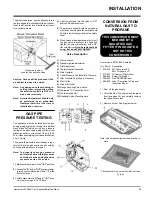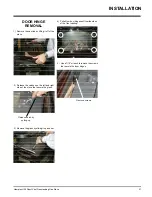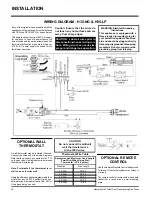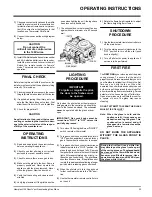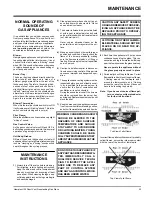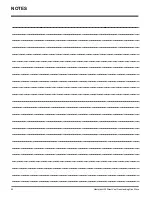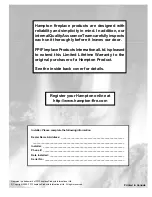
Hampton H35 Direct Vent Freestanding Gas Stove
35
MAINTENANCE
Top View of pilot flame
MAINTENANCE
INSTRUCTIONS
1)
Always turn off the valve before cleaning.
For relighting, refer to lighting instructions.
Keep the burner and control compartment
clean by brushing and vacuuming at least
once a year. When cleaning the logs, use a
soft clean paint brush as the logs are fragile
and easily damaged.
CAUTION: ANY SAFETY SCREEN
OR GUARD REMOVED FOR SERV-
ICING AN APPLIANCE MUST BE
REPLACED PRIOR TO OPERAT-
ING THE APPLIANCE.
CLOTHING OR OTHER FLAMMA-
BLE MATERIAL SHOULD NOT BE
PLACED ON OR NEAR THE AP-
PLIANCE.
Top View of pilot flame
Incorrect flame pattern will have small, probably
yellow flames, not coming into proper contact
with the rear of the burner or thermopile.
NORMAL OPERATING
SOUNDS OF
GAS APPLIANCES
It is possible that you will hear some sounds
from your gas appliance. This is perfectly nor-
mal due to the fact that there are various gauges
and types of steel used within your appliance.
Listed below are some examples. All are
nor-
mal operating sounds
and should not be
considered as defects in your appliance.
Blower:
Hampton gas appliances use high tech blowers
to push heated air farther into the room. It is not
unusual for the fan to make a "whirring" sound
when ON. This sound will increase or decrease
in volume depending on the speed setting of
your fan speed control.
Burner Tray:
The burner tray is positioned directly under the
burner tube(s) and logs and is made of a
different gauge material from the rest of the
firebox and body. Therefore, the varying thick-
nesses of steel will expand and contract at
slightly different rates which can cause "tick-
ing" and "cracking" sounds. You should also be
aware that as there are temperature changes
within the unit these sounds will likely re-occur.
Again, this is normal for steel fireboxes.
Blower Thermodisc:
When this thermally activated switch turns ON
it will create a small "clicking" sound. This is the
switch contacts closing and is normal.
Pilot Flame:
While the pilot flame is on it can make a very slight
"whisper" sound.
Gas Control Valve:
As the gas control valve turns ON and OFF, a
dull clicking sound may be audible, this is normal
operation of a gas regulator or valve.
Unit Body/Firebox:
Different types and thicknesses of steel will
expand and contract at different rates resulting
in some "cracking" and "ticking" sounds will be
heard throughout the cycling process.
SHOULD BE ALERTED TO THE
HAZARDS OF HIGH SURFACE
TEMPERATURE AND SHOULD
STAY AWAY TO AVOID BURNS
OR CLOTHING IGNITION. YOUNG
CHILDREN SHOULD BE CARE-
FULLY SUPERVISED WHEN THEY
ARE IN THE SAME ROOM AS THE
APPLIANCE.
DO NOT USE THIS APPLIANCE IF
ANY PART HAS BEEN UNDER WA-
TER. IMMEDIATELY CALL A
QUALIFIED SERVICE TECHNI-
CIAN TO INSPECT THE APPLI-
ANCE AND TO REPLACE ANY
PART OF CONTROL SYSTEM
AND ANY GAS CONTROL WHICH
HAS BEEN UNDER WATER.
8)
Each time the appliance is lit, it may cause
condensation and fog the glass. This con-
densation and fog is normal and will disap-
pear in a few minutes as the glass heats up.
Never operate the appliance without
the glass properly secured in place.
9)
Periodically check the pilot flames. Correct
flame pattern has three strong blue flames:
1 flowing around the thermopile and 1
around the thermocouple, and 1 flowing
across the rear of the burner (it does not
have to be touching the burner).
Note: If you have an incorrect flame pat-
tern, contact your Hampton dealer
for further instructions.
2)
Clean glass (never when unit is hot), appli-
ance, and door with a damp cloth. Never
use an abrasive cleaner.
3)
The heater is finished in a porcelain finish
or with a heat resistant paint and should
only be refinished with heat resistant paint
(not with wall paint).
Never use an abrasive cleaner on the
porcelain finish as it may scratch the sur-
face.
4)
Make a periodic check of burner for proper
position and condition. Visually check the
flame of the burner periodically, making
sure the flames are steady; not lifting or
floating. If there is a problem, call a qualified
service person.
5)
Caution: Label all wires prior to disconnec-
tion when servicing controls. Wiring errors
can cause improper and dangerous oper-
ation.
6)
The appliance and venting system must be
inspected before use, and at least annual-
ly, by a qualified field service person, to
ensure that the flow of combustion and
ventilation air is not obstructed.
During the annual service call, the burners
should be removed from the burner tray
and cleaned. Replace the embers but do not
block the pilot.
7)
Keep the area near the appliance clear and
free from combustible materials, gasoline,
and other flammable vapours and liquids.
WARNING: CHILDREN AND ADULTS





